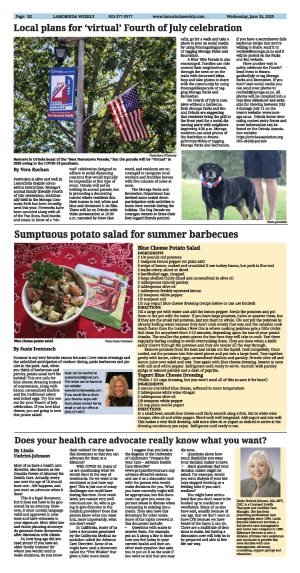| | Published June 24th, 2020
| Does your health care advocate really know what you want?
| | | By Linda Fodrini-Johnson |  | | Linda Fodrini-Johnson, MA, MFT, CMC, is a Licensed Family Therapist and Certified Care Manager. She has been practicing professional care management since 1984. Linda founded Eldercare Services, a full-service care management and home care company in 1989. Eldercare Services is now a division of Home Care Assistance and continues to provide Bay Area families with care management, advocacy, counseling, support groups and education. |
Most of us have a health care directive, also known as the Durable Power of Attorney for Health Care. Actually, everyone over the age of 18 should have one - life happens, and you want an advocate when it does!
 This is a legal document, but it does not have to be generated by an attorney. However, it must contain language valid and approved in your state and have witnesses to your signature. Most elder law and estate planning attorneys do generate these documents after discussion with clients.
This is a legal document, but it does not have to be generated by an attorney. However, it must contain language valid and approved in your state and have witnesses to your signature. Most elder law and estate planning attorneys do generate these documents after discussion with clients.
 So, how long ago did you read yours? If you have an older family member for whom you would need to make decisions, do you know their wishes? Do they have this document so that you can advocate for them at a distance?
So, how long ago did you read yours? If you have an older family member for whom you would need to make decisions, do you know their wishes? Do they have this document so that you can advocate for them at a distance?
 With COVID-19, many of us are questioning what we would want in the way of treatments. Do we want to be ventilated or just have oxygen? This is just one of many challenges one could have during this time. Once ventilated, you cannot very well communicate. So, who is going to give direction to the medical providers? Does that person know what you want and, more importantly, what you don't want?
With COVID-19, many of us are questioning what we would want in the way of treatments. Do we want to be ventilated or just have oxygen? This is just one of many challenges one could have during this time. Once ventilated, you cannot very well communicate. So, who is going to give direction to the medical providers? Does that person know what you want and, more importantly, what you don't want?
 In California, many of us have a document generated by the California Medical Association called the Advance Care Directive. Some of us might have used a document called the "Five Wishes" that gives a little more detail.
In California, many of us have a document generated by the California Medical Association called the Advance Care Directive. Some of us might have used a document called the "Five Wishes" that gives a little more detail.
 I suggest that you look at the Regents of the University of California's "Prepare for your Care - Advance Health Care Directive" www.prepareforyourcare.org/
I suggest that you look at the Regents of the University of California's "Prepare for your Care - Advance Health Care Directive" www.prepareforyourcare.org/
 advance-directive-state/ca
advance-directive-state/ca
 and use it as a discussion tool with the person who would make decisions for you. What you have currently might still be appropriate, but this document can give you some important issues to discuss when comparing to existing documents. They also have this document for other states. Some of the topics covered in this document include:
and use it as a discussion tool with the person who would make decisions for you. What you have currently might still be appropriate, but this document can give you some important issues to discuss when comparing to existing documents. They also have this document for other states. Some of the topics covered in this document include:
 � Questions with scales to answer them. For example, put an X along a line to show how you feel today in your current health and then another such question that asks you to put an X on the scale if you were so sick that you may die soon.
� Questions with scales to answer them. For example, put an X along a line to show how you feel today in your current health and then another such question that asks you to put an X on the scale if you were so sick that you may die soon.
 � Questions about how much flexibility you want your decision maker to have.
� Questions about how much flexibility you want your decision maker to have.
 � Hard questions that your decision maker might be asked. For example, would you want dialysis if your kidneys stopped working or a feeding tube if you can't swallow?
� Hard questions that your decision maker might be asked. For example, would you want dialysis if your kidneys stopped working or a feeding tube if you can't swallow?
 You might have articulated that you don't want to be hooked up to machines or ventilators. Many of us also have said, usually because of our age, that we don't want to have CPR because we have heard of the harm it can do. There are a multitude of decisions to make, but having a discussion now will help us to be prepared and able to live life our way.
You might have articulated that you don't want to be hooked up to machines or ventilators. Many of us also have said, usually because of our age, that we don't want to have CPR because we have heard of the harm it can do. There are a multitude of decisions to make, but having a discussion now will help us to be prepared and able to live life our way. |
| | | | | | | | | | | | |



